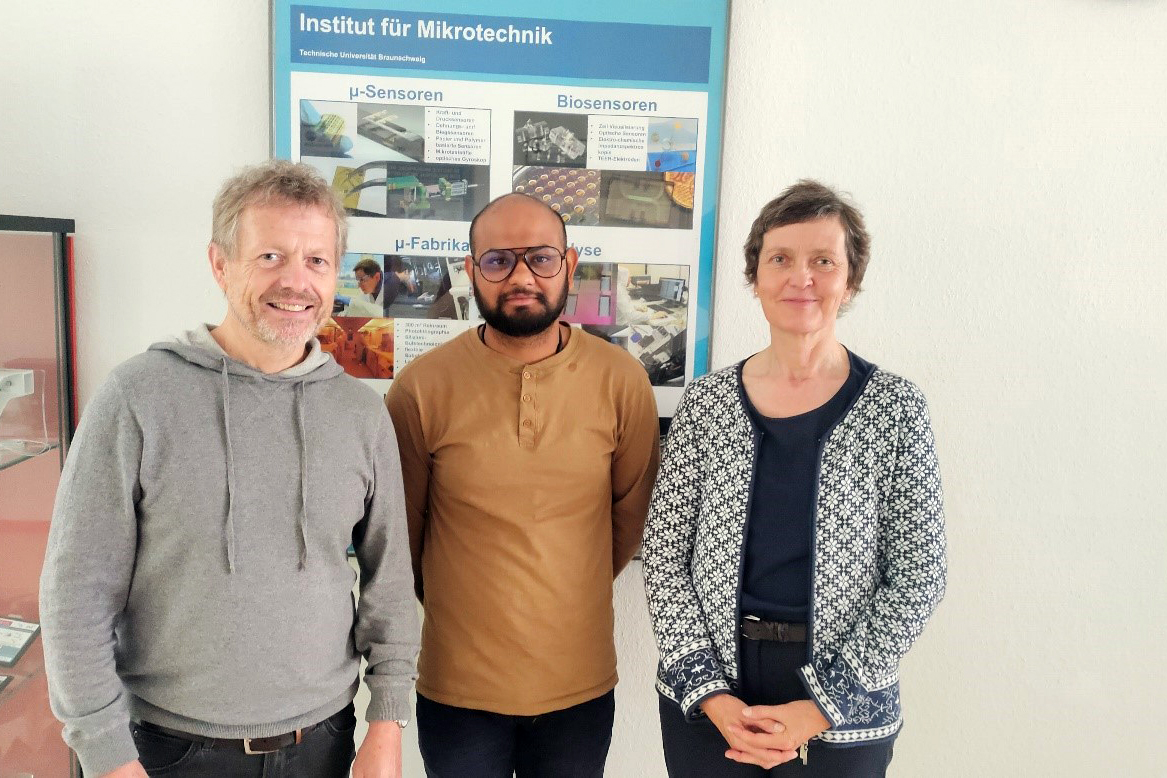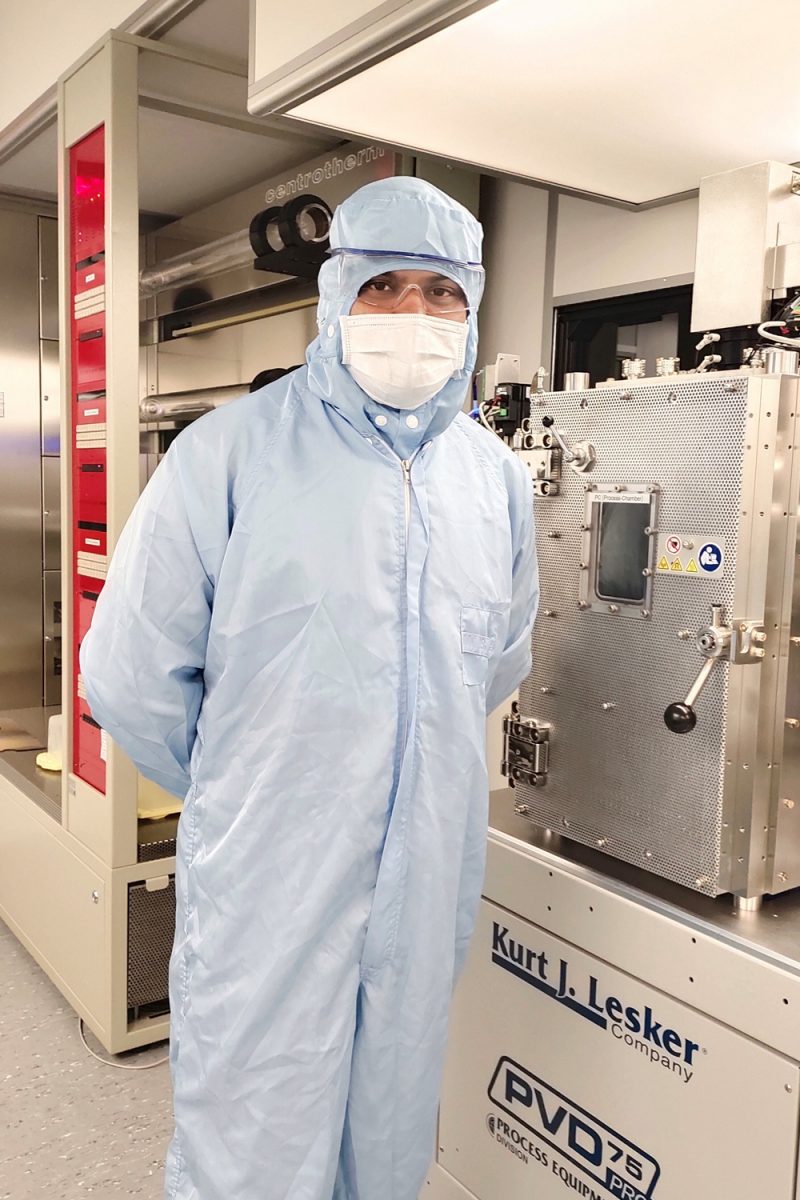Mail from … Braunschweig Ph.D student Gitansh Verma from India spent four weeks at the Institute of Microtechnology
General Information
This is what I did in Braunschweig:
I am here for a collaboration on an project of the Indo-German Science and Technology Centre that was awarded to my Ph.D guide Dr. Shrutidhara Sarma under WISER scheme. WISER stands for ‘Women Involvement in Science and Engineering Research’ and aims to promote female researchers.
The project is a collaboration of the Institute of Microtechnology (IMT) of TU Braunschweig and the Indian Institute of Technology Jodhpur.
At the IMT I worked on flexible and stretchable strain sensors and explored how to design an electronics evaluation system that can extract a reliable output from the sensors. My work was focused on understanding the fabrication technique of the screen-printed sensors and designing a PCB to monitor them. During my stay at IMT, I have gained hands-on experience in bacterial handling and live-organism protocols, honed my skills in circuit design and microfabrication on silicon wafers, and observed clean-room processes such as lithography and wafer bonding. Beyond the laboratory, I made many new friends and had the pleasure of experiencing the warm hospitality of the people here in Braunschweig.
Local Life
This is how I lived in Braunschweig:
I lived in a short-term rental apartment near the campus. It was really easy to find accommodation in Braunschweig. There were no problems. The flat was near the city center, so it had a good connection to the public transport.
What are the differences between researching in Germany and in your home country?
In Germany, I enjoyed direct access to equipment and detailed guidance on how to operate it, which really enhances my work. In India, by contrast, access is often limited because centralized instruments must be reserved in advance. The availability of chemicals and specialized tools was also far better Germany—for example, we could source all our materials from a single vendor, whereas in India one usually has to coordinate with several suppliers. Despite these differences in infrastructure and logistics, I find that the work ethic remains just as strong in both countries—I’ve noticed no real gap in dedication or productivity.
What is the difference between everyday life in Germany and in your home country?
In Germany, there’s plenty of space to roam and excellent city connectivity when it comes to public transport. The city center in Braunschweig and its parks are beautiful, and with a supermarket just steps from my apartment, grocery shopping was very convenient. Although the weather was colder than back home, I actually prefer it that way. I did miss Indian flatbread—despite my best efforts, the local flour here changed the taste—and, more generally, I often longed for Indian cuisine. That said, German sweets are delicious, and as a vegetarian I’ve found plenty of great ingredients and meal options, so cooking at home was both easy and enjoyable. I’d even say I’m a pretty good chef now when it comes to my own meals.
That is what I learned here in the first three days
When travelling by bus, you have to press the stop button for the bus to stop at a bus stop. On my first day, I didn’t know this and travelled too far. I then had to walk back. I also noticed that Germans really appreciate a quiet atmosphere in public and at work.
The biggest challenges during my stay …
- Restaurants that offer good vegetarian food were limited in Braunschweig.
- The daylight was present even until 10:00 in the night, so it was a bit challenging to adjust for first few days.
- People stare a lot sometimes. While that is weird, they are still very helpful if you ask them for something.
What I took home with me from here:
I took several things home with me—above all, cheese (especially Gouda) and chocolate. I’ve also developed an appreciation for opera music. The sounds from different instruments blend together and create very melodious music. I’ve welcomed the peaceful atmosphere here; people’s quiet demeanour has made it easy to focus on my work and myself. And above all, I’ve come to admire the German approach to work–life balance: with clearly defined hours, once you’re clocked out, you’re truly clocked out.
Good to know
These are my tips for other international students or academics who are planning a stay abroad in Germany or are currently doing so:
If you’re planning to study or work in Germany, my first tip is to embrace the local culture and respect community rules—this will help you settle in quickly and enjoy your time. Don’t be shy about reaching out: Germans are generally polite and helpful, so striking up a conversation or asking for advice is easier than you might think. Finally, take full advantage of the excellent public-transport network—trains, trams, and buses make it simple to commute, explore your city, or take weekend trips across the region.
In my opinion, this is something that you should definitely try out in Braunschweig/Germany:
- Visit Berlin to see the cathedrals and historic buildings, they have a really nice architecture.
- Go to Bad Saarow if you like boating or want to spend time in open areas.
- Go on a hiking trip to Harz Mountain, visit the old towns like Goslar and Wernigerode. The castel there is a must.
This is something I would like to add/tell you about:

Gitansh Verma (centre) with Prof. Andreas Dietzel (left) and Sabine Kral-Aulich (right). Picture credits: IMT/TU Braunschweig
I’ve truly enjoyed my time here and would gladly stay longer if the opportunity arises. My sincere thanks go to Andreas Dietzel for welcoming me, and to Sabine Kral-Aulich for her constant support and kindness. I’m also deeply grateful to Dr. Shrutidhara Sarma for making this exchange possible.

